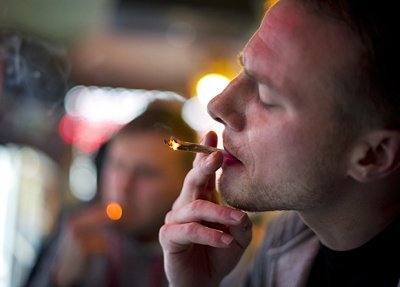
The New York Times editorial board is calling for a repeal of the ban on marijuana. I learned of this with interest. The Times editorial board is staunchly pro-Obama and Democratic. What basis could there be for legalizing marijuana, I wondered, other than the sovereignty of the individual to put into his or her own body what he or she chooses? And, if such sovereignty exists, how does The New York Times justify all the restraints on private property, private wealth, medical care, energy consumption and banking practices imposed by the Obama Administration?
It didn’t take long to find out.
In the first part of an editorial series titled “High Time: An Editorial Series on Marijuana Legalization,” the editorial board of The New York Times on Saturday called for repeal of the ban on marijuana.
The editorial, supported by a series of six background pieces scheduled to appear through Aug. 5, declares: “The federal government should repeal the ban on marijuana.”
The editorial compares the marijuana ban to Prohibition of the early 20th Century, but says that pot is “far less dangerous than alcohol.”
The Gray Lady’s editorial board acknowledged “legitimate concerns about marijuana on the development of adolescent brains,” and called to make marijuana legal only for those 21 or older.
While expressing doubt that a busy Congress will take up the issue soon, the editorial said it is “long past time” to repeal the four-decade-old pot prohibition. [Source: Newsmax.com and The New York Times, 7/26/14]
So The New York Times is saying, “It’s OK to legalize marijuana – because it’s not dangerous (at least not for adults).”
Does this mean that if something is dangerous, or at least deemed so by the government, then it should not be legal?
More broadly: Do we only have the right to engage in activity the government permits us to engage in? Even if that behavior does not violate the right of anybody else? Is government our policeman – or our mommy and daddy? Does having rights mean exercising your adult capacity to reason and think – or only to do what mommy and daddy permit?
Alcohol is dangerous for many, particularly for those who abuse it. Why don’t we outlaw alcohol then, at least for alcoholics? The New York Times does not favor this.
Overeating is dangerous, too – probably the single biggest killer of American citizens today. Why don’t we outlaw overeating?
There are probably some with the mindset of The New York Times editorial board who would go for that; and they certainly favor using the FDA to restrict and restrain poor eating as much as possible. But I don’t know of any Obama Democrats/ New York Times readers who would ever come out in favor of a ban on overeating, despite the fact it’s plainly dangerous. Nor would people with this point-of-view support a restoration of alcohol Prohibition, which the Times editorial implicitly criticizes.
Should marijuana use be legal? Absolutely. However, the reasons justifying its legalization are based on principles The New York Times would never dare name, much less uphold.
The principle—the only principle—for ending the ban on marijuana is the right of the individual to be left alone. Instead, we’re being told that it should be made legal because the Nanny State of government directors has deemed it healthy for us.
This line of reasoning is almost enough to tempt an advocate of individual liberty to support keeping the ban in place, rather than lifting it for reasons as pernicious and condescending as the Times suggests.
The worst implication of this reasoning is the idea that it’s government’s job to say what we may or may not do. The New York Times, along with its equivalents in Congress, the courts and the White House, absolutely believe this. It’s their job to determine what is and isn’t safe, what is and isn’t proper for adults to do, and then issue regulations accordingly.
It’s precisely the opposite of a free country. In a free country, an individual may do absolutely whatever he or she pleases—so long as he does not impose force (or objective fraud) on another. In today’s world, more of us have come to understand only an inversion of this principle: We can do it—if the government approves, at least.
It’s little wonder that Obama and others of his ideological persuasion show so little regard for courts, legislatures or anything but their own wishes when it comes time for action in other matters including (but not limited to): the environment, property rights, medical insurance and gun regulations. If they had their way, we’d simply have a single government branch headed by someone like Obama, who would, case-by-case, decide what’s correct and proper for us to do, or not to do.
I’m all for legalizing marijuana, whether it’s safe or not. And how could we even know? No legitimate research can be conducted on a drug while it’s illegal, particularly since so much research depends on government funding.
We don’t need to know if it’s safe to make marijuana legal. This is the individual’s moral and political right to determine, and to take personal responsibility for whatever results follow.
The saddest thing about all this? The forthcoming liberal-conservative debate will focus on whether marijuana is safe or not, rather than something that matters much more: Our sovereignty over our own minds and bodies.
Be sure to “friend” Dr. Hurd on Facebook. Search under “Michael Hurd” (Rehoboth Beach DE). Get up-to-the-minute postings, recommended articles and links, and engage in back-and-forth discussion with Dr. Hurd on topics of interest.
